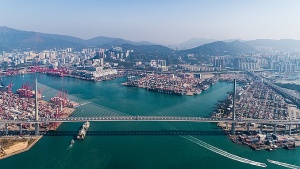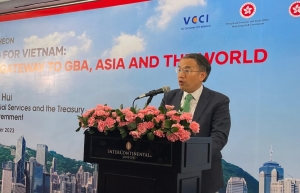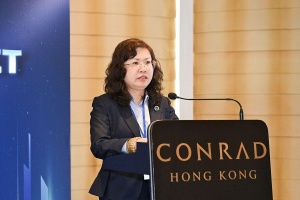Vietnam is a priority market for Greater Bay Area businesses in ASEAN
 |
The report – Navigating Connectivity: Exploring ASEAN Opportunities for the Greater Bay Area – indicated that about 85 per cent of businesses in the GBA plan to maintain or grow their sales to the ASEAN bloc over the next three years. Malaysia, Singapore, Thailand, and Vietnam were the top sales markets for expansion-minded GBA businesses, while Vietnam remained the top choice for procurement and production outsourcing.
Overall, the report shed some light on why GBA businesses find ASEAN appealing. The sheer scale of the ASEAN market was singled out by 55.9 per cent of respondents as a key catalyst for their expansion plans. This was ahead of the 49.6 per cent who highlighted government incentives and investment policies and 32.8 per cent which cited enhanced e-commerce access.
The HKTDC-UOB survey conducted in the third quarter of last year took the form of a questionnaire completed by 671 GBA enterprises, supplemented by in-depth interviews with a representative number of member businesses.
The survey found more than 70 per cent of respondents planned to expand in ASEAN in the next three years, compared with 60 per cent in a similar survey conducted in 2021. The number is even higher for those already established in ASEAN, with 96 per cent of such businesses planning to maintain or expand operations over the next three years.
GBA companies across the four surveyed sectors – consumer goods; business, professional, and financial services; real estate, hospitality and construction; and technology, media, and telecommunications – all saw Malaysia, Singapore, and Thailand as having the greatest potential to thrive in.
In terms of industrial goods, GBA businesses considered Malaysia, Singapore, and Vietnam their priority markets. Malaysia’s popularity across companies in the four sectors was considerably higher than in the 2021 survey.
Besides opportunities, GBA businesses regarded navigating local government policies and regulations (48.6 per cent) as the key challenge to expanding their market share within ASEAN, followed by cultural or language barriers (38.7 per cent) and difficulties in obtaining talent (26.4 per cent). This differs notably from the 2021 survey, which identified inadequate infrastructure, difficulties in finding the right local partners, and the increasing cost of doing business as the top three obstacles.
Overall, 53.7 per cent of GBA companies noted that geographic economic integration initiatives, particularly the Regional Comprehensive Economic Partnership (RCEP), were likely to boost their chances of success within ASEAN, followed by digitalisation (51.9 per cent) and cost management, including moving production to lower-cost locations (40.8 per cent).
Most respondents credited the effectiveness of RCEP at streamlining and accelerating trade between the region’s most dynamic economies – including Mainland China, Vietnam, Indonesia, Malaysia, Singapore, and Thailand – as the main reason for its success.
The surveyed enterprises also believed digitalisation had been crucial for the maintenance of economic and supply chain resilience amidst the unprecedented impact of the pandemic. They also viewed it as a key productivity driver, reducing operational costs and facilitating business and investment expansion in the region. In all, 23.2 per cent of companies saw this as a priority for their business, as it is likely to boost their chances of successfully entering the ASEAN market.
 | Logistics providers in Hong Kong eye Vietnamese market Logistics service providers from Hong Kong are looking to strengthen partnerships with their Vietnamese counterparts to tap into the nation's logistics market. |
 | Hong Kong looks to boost financial cooperation with Vietnam Hong Kong is looking to strengthen its financial services cooperation with Vietnam to facilitate capital flows, investment, and trade activities. |
 | Vietnam aims to elevate its stock market: conference At a Hong Kong-based conference, industry leaders highlighted Vietnam's aspirations to achieve emerging market status, acknowledging both its compelling economic trajectory and the challenges it faces. |
What the stars mean:
★ Poor ★ ★ Promising ★★★ Good ★★★★ Very good ★★★★★ Exceptional
Related Contents
Latest News
More News
- Vietnam-South Africa strategic partnership boosts business links (February 06, 2026 | 13:28)
- Mondelez Kinh Do renews the spirit of togetherness (February 06, 2026 | 09:35)
- Seafood exports rise in January (February 05, 2026 | 17:31)
- Accelerating digitalisation of air traffic services in Vietnam (February 05, 2026 | 17:30)
- Ekko raises $4.2 million to improve employee retention and financial wellbeing (February 05, 2026 | 17:28)
- Dassault Systèmes and Nvidia to build platform powering virtual twins (February 04, 2026 | 08:00)
- The PAN Group acquires $56 million in after-tax profit in 2025 (February 03, 2026 | 13:06)
- Young entrepreneurs community to accelerate admin reform (February 03, 2026 | 13:04)
- Spring Fair 2026 launches national fair series (January 30, 2026 | 16:17)
- SnP celebrates 10th anniversary with new brand identity (January 30, 2026 | 14:41)

 Tag:
Tag:












![[Infographic] AMATA: Industrial and Smart City Developer](https://vir.com.vn/stores/news_dataimages/2026/022026/12/16/croped/amata-industrial-and-smart-city-developer-20260212165823.jpg?260212050401)






 Mobile Version
Mobile Version